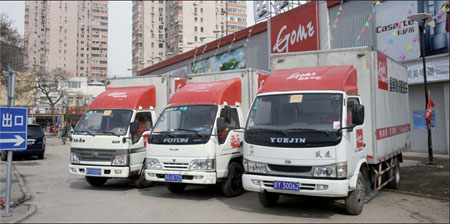Engines of express

| Electrical appliance retailer Gome plans to expand its delivery team as online sales continue to grow. Provided to China Daily |

A number of e-commerce giants are expanding their delivery networks to send orders more quickly to customers
There are more than 214 million online shoppers in China, with orders of clothes, electronics and cosmetics criss-crossing the nation at break-neck speed. But in a country with a bent on consumerism, getting people to shop hasn't been the problem - getting the packages delivered has been the major headache.
In peak online shopping months, especially during Christmas, New Year's, Valentine's Day and Spring Festival, grumbles and groans could be virtually heard throughout China over late deliveries or items that were never received. Even as China's e-commerce market boomed, the lack of timely shipping was its bottleneck.
Zhang Yong, CEO of Tmall.com, China's biggest business-to-consumer website, says delays in deliveries leads to a multitude of online transaction disputes.
"Online shopping websites and couriers normally shirk responsibility and shift the blame to each other as they are unable to guarantee an accurate delivery time to online shoppers," Zhang says.
Not any longer. Recently, major Chinese and foreign e-commerce companies are building upon their express shipping services by both teaming up with express service carriers and expanding their delivery networks.
Tmall, for example, began working with nine express delivery companies this year to offer evening deliveries, accept bank cards or cash for payment on delivery, one-day delivery and next-day delivery. Among the nine, delivery providers include the State-owned China Postal Express & Logistics Co Ltd and private companies such as Yunda Express Co Ltd and YTO Express Co Ltd. The nine companies, according to the State Post Bureau of China, account for the majority of express deliveries in the country.
China Postal Express gives Tmall the power to deliver to 76 cities on more than 1,400 delivery routes. If customers placed an order before 5 pm, the order must be sent before midnight the next day. If a delivery is delayed, customers have the right to demand compensation.
YTO Express, Yunda Express and ZTO Express Service Co Ltd launched a "guaranteed delivery" service for Tmall shop owners and customers. Each of the companies promise to deliver orders within four days.
Relying on more than 400 million users and 50,000 businesses, Tmall saw its sales volume reach 100 billion yuan ($15.7 billion, 12.8 billion euros) last year. The company is planning to roll out more personalized delivery services by the end of this year, including online booking courier services as well as pickup services for returning and exchanging goods. Alibaba Group, the parent company of Tmall, last year announced that it would combine with partners to invest between 20 and 30 billion yuan over the next three to five years to build a network of warehouses across the country.
Other commerce giants in China are following in Alibaba's footsteps. Gome Electrical Appliances Holding Ltd, one of China's largest electronics and appliances retailers, is planning to expand the number of its large-scale distribution centers, from 35 to 44, within the next five years. These centers can take orders directly from Gome's online business platform and send out an order the same day or the next.
To serve Gome's 1,737 stores, the company has established 35 large-scale logistics bases in major cities across China with 96 logistics centers in the country's medium to small cities.
"Online shopping has become a new engine of China's economy," says Lu Jiang, deputy manager of Gome's investor relations.
With a premium placed on quicker shipping services, approximately 70 percent of private couriers in China are taking notice and renting new warehouses, purchasing more delivery vans and hiring more workers.
"Thus, setting up an independent logistics networks and warehouses will help Gome save time on shipping from suppliers to customers and cover more smaller cities," Lu says.
Regular shipping in China works like this: Consumers can send parcels and mail through the State-owned China Post, the umbrella company that runs EMS. For the cost of between 11 yuan to 15 yuan, a consumer can ship a 1-kilogram box domestically with China Post. It's EMS service costs 31 yuan for the Yangtze River Delta region and 18 yuan for the the Pearl River Delta region. EMS, SF Express, Yuantong Express, Shentong Express, Yunda Express, ZTO Express are the most popular choices for express shipping in China. SF Express charges between 15 yuan to 18 yuan, while Yuantong Express charges at least 12 yuan, depending on the weight of the package.
Hou Hanping, a professor of logistics management at Beijing Jiaotong University, believes e-commerce businesses should adjust their marketing strategies even more to ease pressure they place on the express delivery industry.
In a nation where the number of online shoppers in 2011 grew 23.7 percent from the previous year and is to grow to 273 million by the end of this year, major e-commerce companies and conventional retailers are quickly taking advantage of the potential profits while supportive government policies are helping to establish other express services. Last year, the central government released several guidelines to support growth in the express and logistics industry including policies to establish new businesses and expand land use as well as tax reductions.
Hou says that all of these moves are beneficial to building up this industrial chain.
zhongnan@chinadaily.com.cn
(China Daily 08/24/2012 page13)
Today's Top News
- Experts share ideas on advancing human rights
- Japan PM's remarks on Taiwan send severely wrong signal
- Key steps to boost RMB's intl standing highlighted
- Sustained fight against corruption urged
- Xi calls for promotion of spirit of volunteerism
- Xi calls for promoting volunteer spirit to serve national rejuvenation































